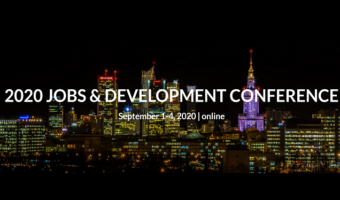Key findings
- With a focus on COVID-19, the 2020 Jobs and Development Conference showcased more than 80 papers from economists and policymakers about a wide range of topics, including inequality, informality, globalization, and gender gaps in the labour market.
- The pandemic threatens the gains achieved in reducing the gender gap in labour participation. Informal workers, women, and youth are particularly vulnerable during these difficult times.
- Countries need to scale up social protection schemes and prioritize skills development and training to better support workers.
The COVID-19 pandemic has exacerbated existing inequalities and is pushing millions of people into extreme poverty. Finding ways to help protect the poor and vulnerable, restore livelihoods and jobs, and bolster economic recovery is a top priority for governments and development experts.
With a special focus on COVID-19, the fourth Jobs and Development Conference: “Better Jobs for Development” discussed a wide range of development issues, including inequality, informality, gender gaps in the labour market, labour mobility, and globalization.
The four-day virtual conference, hosted by the World Bank, IZA, the Network on Jobs and Development, and UNU-WIDER in early September, showcased more than 80 papers from economists, policymakers, and development experts in 15 sessions and attracted more than 2,000 online participants.
In his opening remarks, Michal Rutkowski, the World Bank’s Global Director for Social Protection and Jobs, highlighted the broad range of topics the conference covered and its strong focus on the social and economic impacts of the pandemic.
The conference featured a Policymakers’ Panel on responses to the labour market impacts of COVID-19, a special session of academic papers on the emerging impacts of the pandemic, and two keynote speeches about historical events that shed light on contemporary challenges for labour markets in developing economies.
Gary Fields from IZA commented that “we have developed a large and loyal audience, and I’m delighted that even in these times of the pandemic, we could bring everyone together.”
Global solidarity key to building back better
In his keynote speech, Ian Goldin (University of Oxford) discussed how the coronavirus crisis has “exacerbated, amplified, compressed, and revealed” trends that were already undermining the globalization process in the early years of the 21st Century. Those include rising inequality and declining international cooperation in the face of challenges such as climate change.
Goldin drew attention to the differing impacts of COVID-19 on health and income across ethnic and income groups andstressed the importance of solidarity: “Countries with strong safety nets have high levels of productivity and dynamism [because] people are prepared to take risks, to move, [and] to try new things.”
Goldin also argued that the global shift towards solidarity and cooperation following World War II offers grounds for optimism on the modern world’s ability to respond to the current crisis.
‘Uprooted’ migrants value educational attainment over material wealth
In her keynote speech, Ekaterina Zhuravskaya (Paris School of Economics) discussed her recent research on how forced migration after World War II led to increased education investments by households that had to abandon their physical assets.
“Being uprooted by force … changes how migrants value material goods and increases their investment in the education of their children,” said Zhuravskaya.Modern-day Poles whose ancestors were displaced after World War II have more years of schooling and are more likely to finish secondary and higher education. More education later translates into better jobs and incomes.
This shift towards investing in human capital, as opposed to physical capital, could be lost in the event of another forced expulsion. It has important ramifications for policies to support the victims of forced displacement. “We need to make access to education a priority in countries receiving forced migrants and refugees, as the benefits and returns may be even greater and more persistent than previously thought,” Zhuravskaya added.
The keynote speakers’ messages on addressing inequalities and protecting human capital were echoed by participants in the special session chaired by Piotr Lewandowski from the Institute for Structural Research. The session spotlighted the latest research on the multifaceted effects of the pandemic, including on labour mobility, occupational exposure, mental health in Colombia, and on the amenability of jobs to working from home.
The Policymakers’ Panel, led by Kunal Sen from UNU-WIDER, discussed the employment effects of the pandemic in the global south, with special attention to the livelihoods of the working poor. World Bank expert Indhira Santos, Sangheon Lee from the ILO, Martha Chen from the Harvard Kennedy School, and Haroon Bhorat from the University of Cape Town pointed out that informal workers, youth, and women are particularly vulnerable during these difficult times and that the crisis threatens the gains achieved in reducing the gender gap in labour participation.
Santos emphasized that to increase social protection coverage for all, we need a shift towards financing models based on general taxation and away from contributory systems limited to formal sector workers. The panel discussion concluded with a call to scale up social protection schemes and prioritize skills development and training, which are key to helping protect and employ workers.
The text was originally published on the World Bank’s blogsite.


